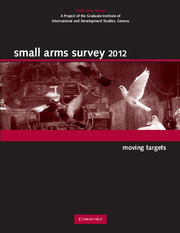Book contents
- Frontmatter
- Foreword
- Contents
- About the Small Arms Survey
- Notes to readers
- Acknowledgements
- Introduction
- Chapter 1 A Fatal Relationship: Guns and Deaths in Latin America and the Caribbean
- Chapter 2 When Business Gets Bloody: State Policy and Drug Violence
- Chapter 3 A Matter of Survival: Non-lethal Firearm Violence
- Chapter 4 Blue Skies and Dark Clouds: Kazakhstan and Small Arms
- Chapter 5 Between State and Non-state: Somaliland's Emerging Security Order
- Photo Essay. Troubled Waters: Somali Piracy
- Chapter 6 Escalation at Sea: Somali Piracy and Private Security Companies
- Chapter 7 Precedent in the Making: The UN Meeting of Governmental Experts
- Chapter 8 Piece by Piece: Authorized Transfers of Parts and Accessories
- Chapter 9 Point by Point: Trends in Transparency
- Chapter 10 Surveying the Battlefield: Illicit Arms in Afghanistan, Iraq, and Somalia
- Index
Chapter 7 - Precedent in the Making: The UN Meeting of Governmental Experts
Published online by Cambridge University Press: 05 February 2015
- Frontmatter
- Foreword
- Contents
- About the Small Arms Survey
- Notes to readers
- Acknowledgements
- Introduction
- Chapter 1 A Fatal Relationship: Guns and Deaths in Latin America and the Caribbean
- Chapter 2 When Business Gets Bloody: State Policy and Drug Violence
- Chapter 3 A Matter of Survival: Non-lethal Firearm Violence
- Chapter 4 Blue Skies and Dark Clouds: Kazakhstan and Small Arms
- Chapter 5 Between State and Non-state: Somaliland's Emerging Security Order
- Photo Essay. Troubled Waters: Somali Piracy
- Chapter 6 Escalation at Sea: Somali Piracy and Private Security Companies
- Chapter 7 Precedent in the Making: The UN Meeting of Governmental Experts
- Chapter 8 Piece by Piece: Authorized Transfers of Parts and Accessories
- Chapter 9 Point by Point: Trends in Transparency
- Chapter 10 Surveying the Battlefield: Illicit Arms in Afghanistan, Iraq, and Somalia
- Index
Summary
INTRODUCTION
How to stop a criminal from removing the identifying marks on a polymer-frame handgun? This was the kind of question asked, and sometimes answered, at the Open-ended Meeting of Governmental Experts (MGE),1 convened at UN headquarters in New York from 9 to 13 May 2011. For the first time at a UN small arms meeting, the discussions were expert-led and relatively interactive as delegations focused on the practical details of weapons marking, recordkeeping, and tracing, specifically as dealt with in the International Tracing Instrument (ITI) (UNGA, 2005).
The MGE produced an official report (UNGA, 2011a) and a more substantive Chair's Summary (New Zealand, 2011c). Yet, as of early 2012, it had not produced much in the way of concrete follow-up. The ideas, proposals, and lessons learned that states shared at the meeting, although reflected in the Chair's Summary, face an uncertain future.
Nor have UN member states decided to convene any future MGEs. Still, the potential impact of the 2011 meeting appears significant.
Drawing on the Chair's Summary and the author's own observations from the meeting, this chapter presents details of the MGE discussions with a view to identifying some of the key impediments to full ITI implementation, as well as the various means of overcoming them. It does not reach any conclusions concerning progress UN member states have made in their implementation of the ITI. Its aim, rather, is to examine the ‘challenges and opportunities’ inherent in such implementation, specifically as discussed at the MGE.
- Type
- Chapter
- Information
- Small Arms Survey 2012Moving Targets, pp. 218 - 239Publisher: Cambridge University PressPrint publication year: 2012



